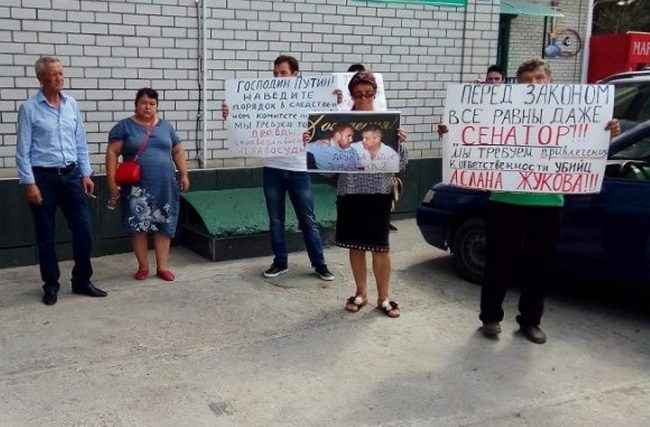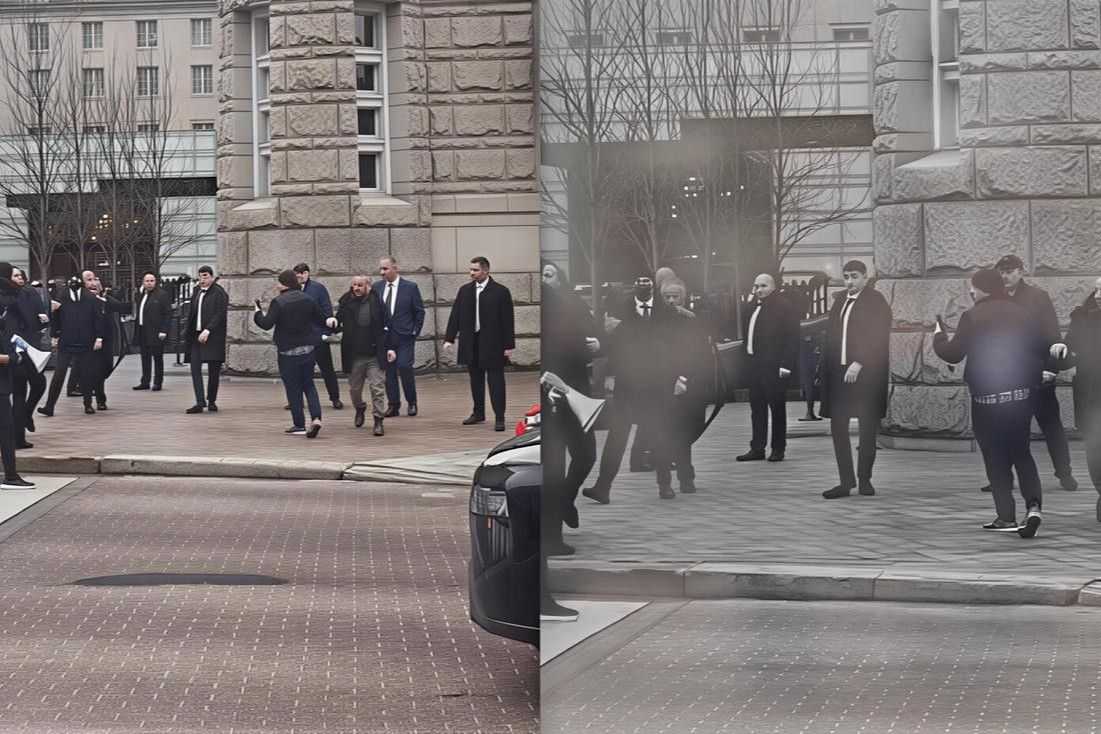Relatives of slain public figures in Karachay–Cherkessia demand senator be brought to justice for ordering killings


 The relatives of two high-profile figures in Karachay–Cherkessia who were murdered in 2010 have began a protest in Cherkessk demanding their killers be brought to justice. Protesters said Fral Shebzukhov, an adviser to the then–president of Karachay–Cherkessia, and public figure Aslan Zhukov were gunned down in separate incidents over disputes with Russian senator Rauf Arashukov.
The relatives of two high-profile figures in Karachay–Cherkessia who were murdered in 2010 have began a protest in Cherkessk demanding their killers be brought to justice. Protesters said Fral Shebzukhov, an adviser to the then–president of Karachay–Cherkessia, and public figure Aslan Zhukov were gunned down in separate incidents over disputes with Russian senator Rauf Arashukov.
On 31 August, relatives began protesting outside the entrance of the Investigative Committee of Karachay–Cherkessia in Cherkessk and accused the authorities of deliberately delaying the investigation.
Both victims were well-known in Karachay–Cherkessia. Zhukov was an athlete and leader of the youth wing of Circassian public organisation Adyge Khase, while Shebzukhov was seen as a contender for head of the government of the republic.
Relatives of the two have accused Rauf Arashukov — a senator from Karachay–Cherkessia in Russia’s upper house, the Federation Council — of ordering the murders. Arashukov is the son of the director of Gazprom’s local subsidiary, Raul Arashukov.
Suspects in both murders as well as one men convicted of killing Shebzukhov have also implicated Arashukov in the killings.
The Investigative Department of Karachay–Cherkessia, headed by Kazbek Bulatov, has not commented on the accusations against Arashukov.
One protester who asked not to be named told OC Media that ‘everyone in this city knows the name of the person who paid for Aslan’s murder, and the testimonies of witnesses are attached’. He claimed Bulatov was a ‘trusted person of the Arashukovs’ and therefore ‘does nothing’. If the local authorities ‘do not react to our demands in the nearest future’, he said protests would move to the General Prosecutor’s Office .
The protester also blamed Rauf Arashukov’s friendship with the head of the Investigative Committee of Russia, Aleksandr Bastrykin, who recently visited the Arashukovs’ Adiyukh Palace VIP Hotel.
‘Ordered through an intermediary’
Aslan Zhukov was shot in the courtyard of his house in March 2010. Friends and relatives claimed at the time that he was murdered because of his public activism. Zhukov’s sister said that shortly before his death, her brother had told her about a disagreement with Rauf Arashukov.
According to her, Arashukov had asked Zhukov to organise young people to storm Karachay–Cherkessia’s parliament to disrupt a session. Aslan recorded the conversation and released it online. Zhukov’s relatives say Arashukov repeatedly threatened him after this.
This version of events was confirmed by Rasul Adzhiyev, who was cleared of murder by a court in 2012.
Adzhiyev handed himself in to the Investigative Committee in August confessing to the crime, and testifying that Rauf Arashukov had ordered the murder through an intermediary — his son-in-law Ruslan Agoyev.
‘Political rivalry’
Fral Shebzukhov was beaten and then shot to death in May 2010. Three people were convicted of his murder, and sentenced to 14–19 years in a strict regime penal colony. One of the three testified that a fourth man, Rustam Kopsergenov, organised the murder on behalf of Arashukov.
Kopsergenov, who was detained six months ago, claimed Arashukov had told him of a dispute with Shebzukhov and paid him to ‘scare’ him.
The day before Shebzukhov was murdered, then–president of Karachay–Cherkessia, Boris Ebzeyev, nominated him for the position of chair of government, and introduced him to the local parliament for approval. Raul Arashukov — Rauf Arashukov’s father — was seen as a contender for the position.
According to Rosbalt, Zhukov’s mother claims investigators deliberately tried to hide who was behind the murder.
Vyacheslav Nagorny, an independent journalist from Karachay–Cherkessia, told OC Media that the cases have been ‘virtually solved’ and can be ‘activated in any moment, if there is a will from Moscow for this’. He said this had not yet happened because the ‘constant threat of criminal prosecution is an effective instrument of control over ambitious and wealthy elites’, which he said was advantageous for the Russian government.









